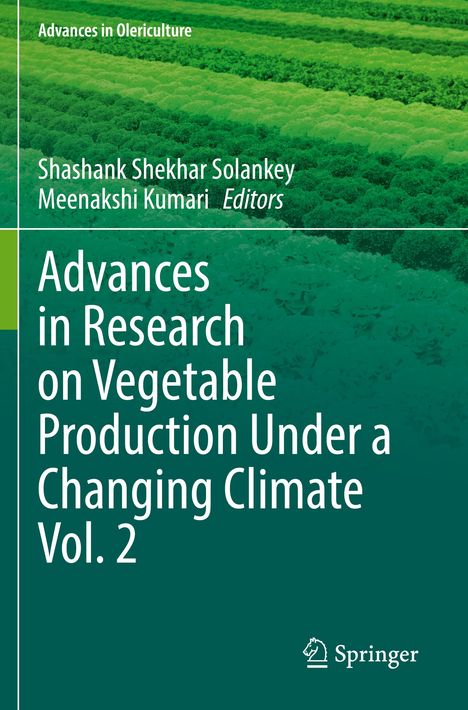Advances in Research on Vegetable Production Under a Changing Climate Vol. 2
Advances in Research on Vegetable Production Under a Changing Climate Vol. 2
Buch
- Herausgeber: Meenakshi Kumari, Shashank Shekhar Solankey
lieferbar innerhalb 2-3 Wochen
(soweit verfügbar beim Lieferanten)
(soweit verfügbar beim Lieferanten)
EUR 186,19*
Verlängerter Rückgabezeitraum bis 31. Januar 2025
Alle zur Rückgabe berechtigten Produkte, die zwischen dem 1. bis 31. Dezember 2024 gekauft wurden, können bis zum 31. Januar 2025 zurückgegeben werden.
- Springer International Publishing, 01/2024
- Einband: Kartoniert / Broschiert, Paperback
- Sprache: Englisch
- ISBN-13: 9783031208423
- Bestellnummer: 11728787
- Umfang: 388 Seiten
- Nummer der Auflage: 24001
- Auflage: 1st ed. 2023
- Gewicht: 587 g
- Maße: 235 x 155 mm
- Stärke: 21 mm
- Erscheinungstermin: 4.1.2024
- Serie: Advances in Olericulture
Achtung: Artikel ist nicht in deutscher Sprache!
Weitere Ausgaben von Advances in Research on Vegetable Production Under a Changing Climate Vol. 2
Klappentext
This second volume on the topic will be extremely useful for the researchers and postgraduate students working on vegetable crops with a special focus on climate change.Today, the entire world is suffering from global warming and its consequent, climate change. This has emerged as the most prominent global environmental issue and there is an urgent need to mitigate its impact on agriculture. Over the past 20 years South Asia has had a robust economic growth, yet it is home to more than one fourth of the world s hunger and 40% of the world s malnourished children and women. Persistent climatic variability, which results in frequent drought and flood, is among the major reasons for this phenomenon. Vegetables are in general more succulent (have 90% water) and more sensitive to climatic vagaries and sudden changes in temperature, as well as irregular precipitation at any phase of crop growing, can affect the normal growth, flowering, pollination, fruit setting, fruit development and fruit ripening which eventually decreases the yield. The irregular precipitation also causes the soil salinity and is a major challenge in many vegetable growing areas. To mitigate the harmful impact of climatic change there is an urgent need to develop adequate adaptation strategies for adverse effect of climate change and preference should be given to the development of heat, cold, drought, flood and salinity stress tolerant genotypes along with climate proofing through conventional and non-conventional breeding techniques, as well as exploiting the beneficial effects of CO2 enhancement on crop growth and yield. Available evidence shows that there is high probability of increase in the frequency and intensity of climate related natural hazards due to climate change and hence increase the potential threat due to climate change related natural disasters in the world. At present protected cultivation and grafted seedlings are also popularizing among vegetable growers because of the huge scope as well as, molecular breeding, emerging insect-pests & diseases and postharvest quality of vegetables under this climate change scenario. Moreover, underexploited vegetables, perennial vegetable and tuber crops have a more tolerant ability to climate vagaries compare to major vegetables which are also discussed in this book.


